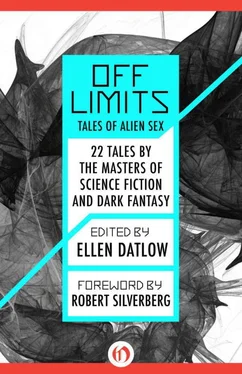“Oh no,” I murmur. “Not now. Not anymore.” I slip off the bed and walk clumsily toward Angèle and hold her in humility and run my hand over her back. I feel for the first time the ROM port between her shoulder blades. Her disguise hid that, too, till now. What a clever dance Helene has written for her!
My heart jolts up into my mouth. “Helene?”
“Hello.” Her tongue is hot on my cheek.
She laughs, and her laughter is a promise: peace… riches… revolution…
Grand Prix
Simon Ings
When I wrote this, it was cool to be a “New Man”; why, I’ll never know, but overnight this turned male fecklessness into some sort of political style statement. My decision to wire all this into semiotics and motor racing was entirely arbitrary: They were simply what I knew at the time.
My protagonist thinks he’s very sophisticated, very postmodern: underneath he’s just not that clever. We may imagine that for him, joining the Programme is only one in a long series of epiphanic episodes: sexual encounters; sexual-political conversions; motor racing, of course. He is without qualities: new ideas infect him continually. He will forever be repudiating one belief for another, one lover for another.
The House of Mourning
BRIAN STABLEFORD
Brian Stableford was born in Shipley, Yorkshire, in 1948. He was a lecturer in sociology at the University of Reading until he became a full-time writer in 1988. He has published more than forty novels, including The Empire of Fear and Young Blood. He is also a prolific writer of nonfiction about the history of imaginative fiction; two collections of his essays were released by the Borgo Press during 1995.
Anna could well be a descendent of Miss Dade in “The Lucifer of Blue”—like her predecessor she’s proud, or at least comfortable with her chosen profession. In the past, prostitutes and their johns were too often victims of incurable diseases such as syphillis and gonorrhea. In Stableford’s future, the diseases are just as deadly and the attitudes of those outside the profession just as intolerant.
ANNA STARED AT HER thin face in the mirror, wondering where the substance had gone and why the color had vanished from the little that remained. Her eyes had so little blue left in them that they were as grey as her hair. She understood enough to know that a disruption of the chemistry of the brain was bound to affect the body as profoundly as the mind, but the sight of her image in the soul-stealing glass reawakened more atavistic notions. It was as if her dangerous madness had wrought a magical corruption of her flesh.
Perhaps, she thought, it was hazardous for such as she to look into mirrors; the confrontation might be capable of precipitating a crisis of confidence and a subsequent relapse into delirium. Facing up to the phantoms of the past was, however, the order of the day. With infinite patience she began to apply her makeup, determined that she would look alive, whatever her natural condition.
By the time she had finished, her hair was tinted gold, her cheeks delicately pink, and her lips fulsomely red—but her eyes still had the dubious transparency of raindrops on a window pane.
Isabel was late, as usual. Anna was forced to pace up and down in the hallway, under the watchful eyes of the receptionist and the ward sister. Fortunately, she was in the habit of dressing in black for everyday purposes, so her outfit attracted no particular attention.
The ward sister was there because there was a ritual to be observed. Anna couldn’t just walk out of the hospital, even though she was classed as a voluntary patient. She had to be handed over in a formal fashion, to signify that responsibility was being officially transferred from one sister to another. Not that Isabel really was her sister in a biological sense, any more than the ward sister was; she and Anna had simply been parts of the same arbitrarily-constructed foster family. They were not alike in any way at all.
When Isabel finally arrived, in a rush, with all her generous flesh and hectic color, the ceremony began.
“You must remember that this is Anna’s first day out,” the ward sister said to Isabel. “We don’t anticipate any problems, but you must make sure that she takes her medication at the appointed times. If she shows signs of distress, you should bring her back here as soon as possible. This emergency number will connect you with a doctor immediately.”
Isabel stared at the number scrawled on the card as though it were the track of some mysterious bird of ill omen.
To Anna, the sister said only: “Be good.” Not “Have a nice time” or even “Take it easy,” but simply “Be good.” It’s better to be beautiful than to be good, Anna thought, but it’s better to be good than to be ugly. She had been beautiful once, and more than beautiful—so much more as to be far beyond the reach of Saint Oscar’s ancient wisdom, but now there was nothing left to her except to be good, because her more-than-beauty had gone very, very bad.
Isabel, of course, had no idea that Anna was on her way to a funeral, and that her role was merely to provide a convenient avenue of escape. Anna waited until the car was a good two miles away from the hospital before she broached the subject. “Can you drop me at the nearest tube station,” she said lightly, “and can you let me have some money.”
“Don’t be silly,” Isabel said. “We’re going home.”
Isabel meant her own home, where she lived with a husband and two children, paying solemn lip service to the social ideal. Anna had seen Isabel’s husband three or four times, but only in the distance. He was probably one of those visitors’ partners whose supportive resolution failed at the threshold of Bedlam—many in-laws preferred to wait outside while their better halves attended to the moral duty of comforting their afflicted kin—but it was possible that Isabel had forbidden him to come in and be properly introduced. Few women relished the prospect of introducing their husbands to whores, even whores who happened to be their sisters—legalistically speaking—and whose sexual charms had been obliterated in no uncertain terms.
“No we’re not,” Anna said. “That’s just something I had to tell the doctors, so they’d let me out. If I’d told them the truth, they’d have stopped me, one way or another.”
“What truth?” Isabel wanted to know. “What on earth are you talking about? I’ll have you know that I’ve gone to a lot of trouble over this. You heard what the nurse said. I’m responsible for you.”
“You won’t be doing anything illegal,” Anna told her. “I’ll get back on time, and nobody will be any the wiser. Even if I didn’t go back, nobody would blame you. I’m the crazy one, remember. How much cash can you let me have?”
“I don’t have any cash,” Isabel told her, as she drove resolutely past Clapham South tube station without even hesitating. “I don’t carry cash. Nobody does. It’s not necessary anymore.”
That was a half-truth, at best. At the Licensed House where Anna had worked, the clients had used their smartcards, and the transactions had been electronically laundered so that no dirty linen would be exposed to prying wives or the Inland Revenue. The streetwalkers who haunted the Euroterminal and the Bull Ring had smartcard processors too, but their laundering facilities were as dodgy as their augmentations and most of their clients paid in cash.
“You can still get cash, can’t you?” Anna said, innocently. “Walls still have holes, just like spoiled whores. Don’t worry about missing Clapham South. Vauxhall will be fine.”
Читать дальше












